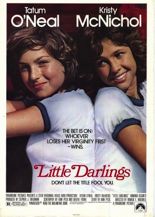
 Little Darlings is a film that could reasonably only have been made in the period that marked the end of the ’70s and the beginning of the ’80s. This is because, like American Pie, Little Darlings is a film about teenagers making a bet to see who will be the first to lose their virginity, but unlike American Pie, it’s teenage girls who are depicted making this life-lesson-in-the-making wager.
Little Darlings is a film that could reasonably only have been made in the period that marked the end of the ’70s and the beginning of the ’80s. This is because, like American Pie, Little Darlings is a film about teenagers making a bet to see who will be the first to lose their virginity, but unlike American Pie, it’s teenage girls who are depicted making this life-lesson-in-the-making wager.
That distinction should be enough to scare studios away from remaking it, but what truly makes it a product of its time is an earnestness and sincerity that bears no relation to the kind of movies Hollywood makes in today’s cultural climate, where 15-year-olds are allowed to dress like porn stars, so long as their hands sport a purity ring. Little Darlings is a flawed film, but one which approaches its potentially icky plot with far more care and respect than you’d ever assume based on description alone.
 In what amounted to a 1980 casting coup, the film stars Academy Award winner Tatum O’Neal and two-time Emmy winner, Kristy McNichol (who just happened to be my first celebrity crush when I was 8 years old) as the titular darlings. O’Neal is Ferris, the rich girl, and McNichol is Angel, the tough girl; they quickly become summer-camp rivals and compete to “become women” by pursing Armand Assante and Matt Dillon, respectively.
In what amounted to a 1980 casting coup, the film stars Academy Award winner Tatum O’Neal and two-time Emmy winner, Kristy McNichol (who just happened to be my first celebrity crush when I was 8 years old) as the titular darlings. O’Neal is Ferris, the rich girl, and McNichol is Angel, the tough girl; they quickly become summer-camp rivals and compete to “become women” by pursing Armand Assante and Matt Dillon, respectively.
Darlings‘ two female screenwriters clearly were interested more in Angel, as her story gets much more screen time, to the point that Ferris almost becomes a supporting character, but that’s probably a good thing since McNichol’s performance is the highlight and by far the best reason to search for what has now become a difficult film to find, despite its original box-office success. —Allan Mott

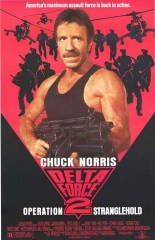
 There are two kinds of Chuck Norris films. The first create a decent enough entertainment around His Holy Beardness by surrounding him with actors capable enough to distract the audience from the immovable post that is Grimace Highkicky, such as
There are two kinds of Chuck Norris films. The first create a decent enough entertainment around His Holy Beardness by surrounding him with actors capable enough to distract the audience from the immovable post that is Grimace Highkicky, such as 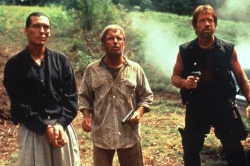 Directed by Aaron Norris (favorite bro of Bristle McSoloflex, and as fine a director as his sib is an actor), Delta Force 2 finds Punch Rockgroin leading some kind of anti-terrorist group, a leader so magnetic that no backstory or character development is necessary. After a friend is killed by Drago, The Beard with No Name works out his rage by kicking the snot out of his men in a training exercise and then traveling to South America for revenge, backed by the U.S. government.
Directed by Aaron Norris (favorite bro of Bristle McSoloflex, and as fine a director as his sib is an actor), Delta Force 2 finds Punch Rockgroin leading some kind of anti-terrorist group, a leader so magnetic that no backstory or character development is necessary. After a friend is killed by Drago, The Beard with No Name works out his rage by kicking the snot out of his men in a training exercise and then traveling to South America for revenge, backed by the U.S. government. 
 Archeologist, puzzle solver and true gentleman Professor Layton jumps from the Nintendo DS to the movies in the animated feature
Archeologist, puzzle solver and true gentleman Professor Layton jumps from the Nintendo DS to the movies in the animated feature  Along the way, the group faces sharks on a ocean voyage, an island rife with hungry wolves, and a castle filled with labyrinthian tunnels, through which they’re pursued by phantom-masked henchmen. It’s cute, enjoyable and better than your average anime, for which director Masakazu Hashimoto has been responsible in the past.
Along the way, the group faces sharks on a ocean voyage, an island rife with hungry wolves, and a castle filled with labyrinthian tunnels, through which they’re pursued by phantom-masked henchmen. It’s cute, enjoyable and better than your average anime, for which director Masakazu Hashimoto has been responsible in the past. 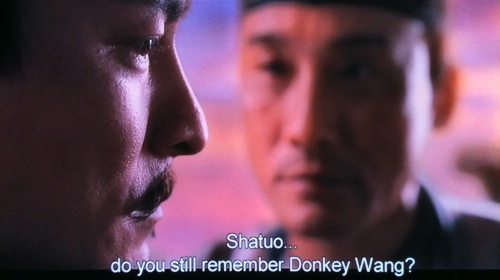
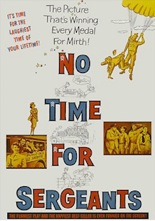
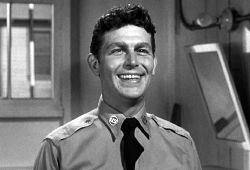 If this sounds familiar, it’s because Griffith used the concept as the basis for his Mayberry spin-off
If this sounds familiar, it’s because Griffith used the concept as the basis for his Mayberry spin-off